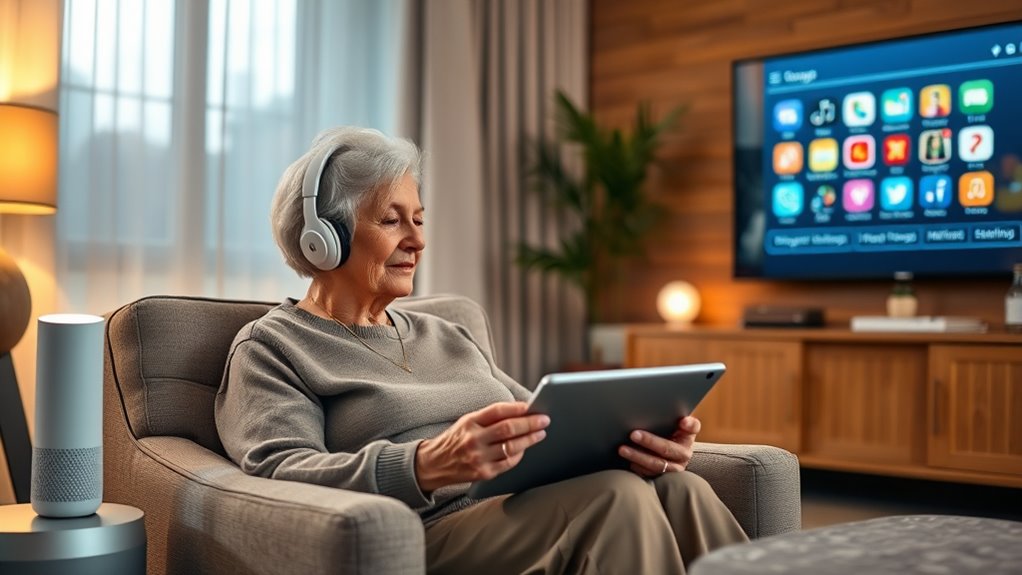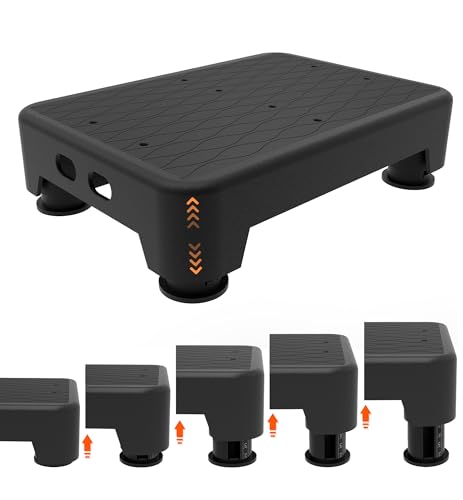Technology tools supporting senior mental health include digital therapy platforms that connect you with licensed therapists via secure video calls and apps, making mental health support convenient and accessible. Virtual companionship services use AI or volunteers to engage you in conversations or activities, reducing feelings of loneliness. User-friendly designs focus on privacy and ease of use, ensuring you can navigate comfortably. Combining these tools can improve your overall well-being, and there’s more to discover about how they can benefit you.
Key Takeaways
- Digital therapy platforms offer accessible, secure mental health support via video, messaging, and tailored programs for seniors.
- Technology-driven tools monitor mental health progress and adapt interventions to meet individual needs.
- Virtual companionship using AI or volunteers reduces loneliness through engaging conversations, games, and personalized activities.
- User-friendly interfaces with large buttons and clear instructions ensure easy navigation for seniors with limited tech experience.
- Combining digital therapy and virtual companionship enhances overall mental well-being and resilience for seniors.

As technology continues to evolve, it offers valuable tools to support seniors’ mental health and well-being. One of the most impactful advancements is digital therapy, which provides a convenient and accessible way to address emotional and psychological challenges. With digital therapy platforms, you can connect with licensed therapists through secure video calls, messaging, or app-based programs. This means you don’t have to worry about travel or scheduling conflicts; you can seek help from the comfort of your home. Digital therapy also offers tailored programs for common concerns like anxiety, depression, or grief, allowing you to work on your mental health at your own pace. Many platforms incorporate cognitive-behavioral techniques and mindfulness exercises, which can be particularly beneficial for seniors managing chronic health issues or feelings of loneliness. Additionally, technology-driven mental health support can help monitor progress and adapt interventions over time. Alongside digital therapy, virtual companionship has become a crucial tool in combating loneliness and fostering emotional connection. Virtual companionship programs use artificial intelligence or trained volunteers to engage seniors in meaningful conversations, games, or shared activities. These tools are designed to simulate human interaction, offering a sense of connection even when family or friends aren’t nearby. You might find yourself chatting with an AI-powered robot or participating in regular video calls with a volunteer who genuinely cares. These virtual companions can help reduce feelings of isolation, promote mental stimulation, and provide a sense of routine and purpose. Many programs are customized to your interests, whether you enjoy discussing current events, reminiscing about the past, or exploring new hobbies. Both digital therapy and virtual companionship are built with user-friendly interfaces, making them accessible even if you’re not tech-savvy. They often include features like large buttons, clear instructions, and easy navigation so you can focus on the interaction rather than struggling with technology. These tools also prioritize privacy and security, ensuring your conversations and data are protected. As you explore these options, you might find that they complement each other—digital therapy helping you work through complex emotions and virtual companionship providing ongoing emotional support. Together, these technological innovations can markedly enhance your mental well-being, providing you with accessible, personalized, and compassionate support right at your fingertips. Embracing these tools empowers you to take an active role in maintaining your mental health, fostering resilience, and enriching your quality of life as you age.

LIFTOZA 5-Level Adjustable Step Stool, 700 LBS Capacity Safety Bed Step for Seniors, Exercise Setp Platform, Portable Stair Assist for Elderly, Wide Step up for Kitchen, Car, Bedside & Shower, Black
Safety First: This adjustable step stool crafted with premium plastic for superior durability and drop resistance. Features an…
As an affiliate, we earn on qualifying purchases.
As an affiliate, we earn on qualifying purchases.
Frequently Asked Questions
How Do Technology Tools Improve Social Connections for Seniors?
You can stay connected and boost your social life by using technology tools that foster virtual companionship and online support groups. These platforms let you chat with friends, join discussions, and share experiences from home. They reduce feelings of loneliness, keep you engaged, and help you build new relationships. With just a device and internet, you’re empowered to stay socially active, supportive, and connected no matter where you are.
Are These Tools Accessible for Seniors With Limited Tech Experience?
You might wonder if technology tools are accessible for seniors with limited tech experience. The good news is, many are designed with user friendliness in mind, making them easier to navigate. Plus, offering tech training helps seniors become comfortable and confident using these tools. With patience and support, even those new to technology can benefit from these tools to stay connected and engaged, enhancing their mental health and overall well-being.
What Privacy Measures Protect Seniors Using Mental Health Apps?
Think of privacy measures like a sturdy lock on a safe. They protect your data security and user privacy by encrypting information and requiring strong authentication. Developers often use secure servers and regular updates to defend against breaches. These measures guarantee your sensitive mental health data stays confidential, just like a safe keeps valuables protected. When choosing apps, look for clear privacy policies and security features to safeguard your information effectively.
Can These Tools Replace Traditional Mental Health Therapy?
You might wonder if digital therapy and virtual support can replace traditional mental health therapy. While these tools offer convenient access and immediate support, they often lack the personalized touch and in-depth care of face-to-face therapy. These tools are excellent for supplementing your mental health journey, providing ongoing support between sessions. However, for complex issues, traditional therapy remains essential. They can work together to enhance your overall mental well-being.
How Cost-Effective Are These Technology Solutions for Seniors?
Did you know that digital mental health tools can reduce costs by up to 30% compared to traditional therapy? You should consider an affordability analysis and a cost-benefit comparison to see how these solutions fit your budget. These tools often provide accessible, scalable support, making mental health care more affordable for seniors. Overall, they’re a cost-effective option that can supplement or even replace in-person services for many seniors.
virtual companionship robot for elderly
As an affiliate, we earn on qualifying purchases.
As an affiliate, we earn on qualifying purchases.
Conclusion
Embracing these technology tools is like planting seeds in a garden of hope, helping your mental health blossom even in challenging times. With each app and device, you’re nurturing a brighter, more connected future where you feel supported and understood. Think of technology as a caring lighthouse guiding you through stormy seas toward calm and clarity. By leveraging these tools, you’re turning the digital landscape into a sanctuary where your well-being can flourish and shine.

DAVIKO Pedometer Watch Senior Friendly No App/Phone Required, Waterproof Fitness Tracker Watch with Step Counter Calories/Sleep Tracker for Walking Running for Men Women
No APP & Phone Required Pedometer Watch: The pedometer watch can be used seperately without APP or smartphone…
As an affiliate, we earn on qualifying purchases.
As an affiliate, we earn on qualifying purchases.

AI MADE SIMPLE FOR SENIORS Basic Benefits and Uses with ChatGPT, Claude, Alexa, Siri: Stay Connected, Independent & Safe – Master Health Apps, Video Calls, Voice Assistants Without Tech Overwhelm
As an affiliate, we earn on qualifying purchases.
As an affiliate, we earn on qualifying purchases.









